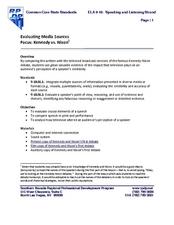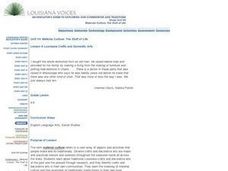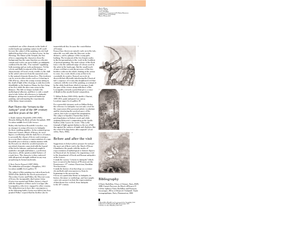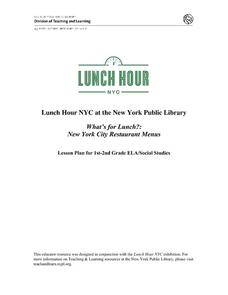Curated OER
Perceived Risks
Students rank a list of everyday risks to compare with classmates. They rate each risk on both its ability to be controlled and its observability in the environment. Results are graphed.
Teach With Movies
Learning Guide to: Schindler's List
Take your history class through Schindler's List with a learning guide, which offers an introduction to the film and a variety of discussion questions and related assignments. There are several useful resources in the sidebar, such as a...
Southern Nevada Regional Professional Development Program
Evaluating Media Sources
Just how much influence did television have on the results of the 1960 presidential election? Media critics contend that the results were all about how the two candidates appeared on the screen. Give your young historians a chance to...
Prestwick House
I Am Malala
I Am Malala: The Girl Who Stood Up for Education and Was Shot by the Taliban by Christina Lamb and Malala Yousafzai is an inspirational tale of heroism through adversity. Focus on the key details of the book with a quick review crossword...
Curated OER
Learning Through Autobiographical Situations
A special education classroom examines a variety of literature from Latin American authors. In groups, they read excerpts from many autobiographies and compare them with their own life. After writing their own autobiographies, they...
Stanford University
Beyond Vietnam
On April 4, 1967 Martin Luther King, Jr. delivered his speech "Beyond Vietnam." The controversy that followed is the focus of a three-lesson unit that asks class members to consider the political and social implications of King's stance.
PBS
Who Knows Best
Finding an expert in a given field when conducting research can be a challenge. This guide provides step-by-step directions as well as links to resources that help young sleuths find the authorities and experts they need. As a bonus, two...
Curated OER
Presidential Election Year: Major Issues
Whether or not it's a presidential election year, this debate activity will spark research on current political issues. Split your government scholars into 4 groups and assign each a political party. One person will be the "candidate"...
Curated OER
Patriotic Symbols of the United States
Young historians take a close look at the most famous patriotic symbols of the United States and determine what they actually stand for. Symbols such as Uncle Sam, The Statue of Liberty, The Bald Eagle, and The Liberty Bell are studied....
Curated OER
Arkansas Civil War Bandits and Outlaws
Young historians study civilian Arkansas during the Civil War. They look at the many challenges they faced to keep their homes in order while the men were at war. Learners hear stories of bands of outlaws who ravaged the state during...
Curated OER
The Mastodon Kill
Using the book Bandits, Bears, and Backaches, learners develop an understanding of the pre-history of Arkansas. They follow the trail ofthe giants mastodons and paleo Indians who lived there long ago. The emphasis on this lesson is on...
Curated OER
Mobile Phones
Mobile phones and how they are used is the focus of this sociology lesson. In it, middle and high schoolers explore how they use mobile phones. They create and act out conversations, text messages, and take a close look at how texting is...
Curated OER
The Trial of the Bloody Sucker
A blood sucking what? Grade schoolers identify the characteristics of blood sucking parasites. They organize their information, identify their arguments, and present them to the class in persuasive arguments. They participate in a debate...
Curated OER
Post-Colonial Writers Unit
How do cultural and historical background impact thought? To explore this essential question, class members view of portion of the film, The Passage to India, read an excerpt from The Magician’s Nephew, and Nissim Ezekiel’s poem, "In...
Curated OER
Basic Needs
Students examine the unique and diverse historical artifacts that people have designed to fulfill their everyday needs in extraordinary ways. They identify ways humans have used design throughout history to enhance the ways they meet...
Curated OER
Personal Experience Narratives
Help your middle schoolers identify personal experience narratives in their own lives through telling stories themselves and from family members or other adults. They study personal experience narratives in Swapping Stories and compare...
Curated OER
Louisiana Crafts and Domestic Arts
Discuss with the class the reasons for identifying and defining the term material culture as refering to a vast array of objects and activities that people make and do traditionally. Your class can identify diverse crafts and decorative...
Curated OER
Irregular Past Participles
Even though this activity on past participles is designed for an ESL class, it could work in any class setting. Questions prompt students to fill in the blanks with past participles, and to think about the functions of participles within...
Curated OER
Fifteen Seconds of Fame
A reading of Panic in Paris launches a review of the elements of narrative writing. Class members work in groups to find narrative devices in the book and record their findings on a provided worksheet. Using the completed pages, emergent...
Curated OER
References to Antiquity in Visual Arts (1848 - 1914)
Examine the Latin and Greek language and civilization during the 19th century by exploring the mediums available then. Students examine scenes related to Greek and Roman literature and compare and contrast them.
Teacher Created Resources
Angelina and Sarah Grimke: Sisters of Social Reform
Who are the Grimke sisters? Scholars find out with a worksheet that details the struggles and triumphs of the lives of Angelina and Sarah Grimke. After reading an informational text, class members have the opportunity to show what they...
Curated OER
Our Intriguing Star, the Sun!
Explore the sun in a lesson plan about space. The lesson spans ten weeks, with students performing activities to answer weekly questions about the Sun and Earth.
Curated OER
Using Poetry in Teaching Reading to Special Education Students
A series of well-written activities, these lessons prompt middle schoolers reading below grade level (at a second, third, or fourth grade level) to use poetry to practice basic reading skills. They rhyme, build words, make inferences,...
New York Public Library
What's for Lunch?: New York City Restaurant Menus
Do you remember the days when a cup of coffee cost five cents? At A.W. Dennett restaurant in 1894, you could buy a five-cent cup of coffee and as well as a five-cent slice of pie to accompany it. The menu from that year is a primary...

























